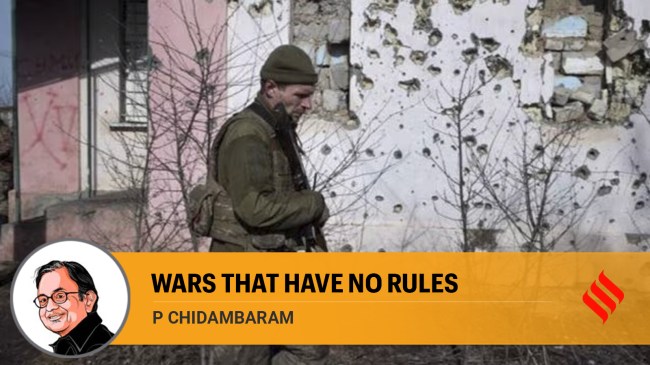Opinion P Chidambaram writes: Wars that have no rules
The United Nations has spectacularly failed in its goals of saving generations from the scourge of war and of ensuring that armed force is not used.
 Battles were fought between soldiers on battlegrounds from sunrise to sunset. The battle resumed the next day at sunrise. (Representational Image)
Battles were fought between soldiers on battlegrounds from sunrise to sunset. The battle resumed the next day at sunrise. (Representational Image) Several millennia since the origin of the human species, and despite multiple claims that Homo sapiens are the most advanced and intelligent living species on this planet, I am afraid we are no different from the original Neanderthals. They fought battles without rules and we fight wars without rules.
Were there rules of war at any time in human history? A poem composed by Nettimayyar (circa 200 AD) laid down the basic rules of war among Tamil kings. The warrior-king who intends to wage war will issue a forewarning:
Aavum, aaniyar parppana maakkalum,
pendirum, piniyudaiyeerum, peni
thenpulam vazhnarkku arungadan irrukkum
ponpor pudalvar peraatheerum,
em ambu kadividuthum, nun aran sermin
Roughly translated, the poem is:
Cows, gentle religious priests,
women, the sick,
those who have no children to do the last rites,
our arrows will be aimed fast,
hasten to your safe places
Battles were fought between soldiers on battlegrounds from sunrise to sunset. The battle resumed the next day at sunrise. According to Kamban, the great poet who wrote Ramayana in Tamil, Ram is believed to have told a weary and defeated Ravan, “today, you may go, and return to battle tomorrow”.
Wanton Killing over Land
If wars may be called civilised, ancient wars were indeed civilised and fought according to some rules. Not in the modern age. The two wars that are being fought today between Russia and Ukraine and between Israel and the Hamas are particularity brutal wars. There has been indiscriminate bombing. Whole cities and towns have been reduced to rubble in Ukraine and in Gaza. Hospitals and schools have been completely destroyed. Several thousand, including children, women, the elderly and patients have been killed. Internally displaced people have been lodged in camps without basic facilities. Thousands of homeless people have been forced to migrate to neighbouring countries. Water supply and electricity have been cut. Food supply has been severely interrupted. Medicines are scarce. Trucks carrying aid supplies have been stopped.
What is the war for? In the Russia-Ukraine war, the issue is dominance. Ukraine was part of the Soviet Union between 1922 and 1991. Thousands of ethnic Russians settled in parts of Ukraine and became the dominant group. After independence, Ukraine was a buffer between NATO countries and Russia. Russia fears that if Ukraine joined NATO, it will bring NATO forces up to its border. So, Russia wants Ukraine as a ‘neutral’ state and also wants to annexe those parts of Ukraine where ethnic Russians had settled. The war is over land — to annexe part of the land and to neutralise the rest.
In the Israel-Hamas war too, the conflict is over land. All Palestinians — some of whom are represented by the Hamas — believe that the Jewish people have usurped their land. The land was called Palestine and was occupied by Arabs, Jews and Christians. The state of Israel was created under the mandate of the United Nations and the Jewish people were settled, since 1948, on the land. Modern Israel has become a strong state that has the capacity to defend itself against hostile neigbours. It is the only nuclear power in the region. History may be on the side of the Palestinians but the reality is that the state of Israel cannot be wiped off the face of earth.
UN Powerless
The United Nations is an impotent body. It cannot enforce the UN Charter that starts with lofty goals: “We the peoples of the United Nations determined to save succeeding generations from the scourge of war, which twice in our lifetime has brought untold sorrow to mankind, and…to ensure…that armed force shall not be used, save in the common interest…”
The United Nations has spectacularly failed in its goals of saving generations from the scourge of war and of ensuring that armed force is not used. Besides, the nature of war has changed. Man no longer fights man, hand to hand combat is history. Machines fight machines. Drones fight missiles. Missiles fight anti-missiles.
If the world cannot find a mechanism to resolve land disputes, wars are inevitable. The dispute between Pakistan and India is over land. Right-wing extremists find it convenient to portray the conflict as one between Hindu India and Islamic Pakistan. It is a mischievous theory. Both countries accepted Partition and the two Independence Acts. The dispute is over land that Pakistan covets. The dispute between China and India is also over land, but it is a bit more complicated because large parts of the border were undemarcated and there are rival claims. The way forward is negotiation, not war. As the prime minister said, “this is not an era of war.”
Absent a Tribunal
Pope Francis has made frequent appeals for peace to Russia and Ukraine and to Israel and the Hamas, but nobody will listen to him. One of his predecessors made a fervent appeal “No more war, never again war”. It fell on deaf ears and many wars have blighted this planet.
The United Nations Convention on the Law of the Sea (1982) has been ratified by over 150 countries. Several disputes have been resolved by the International Tribunal for the Law of the Sea, including one involving India and Italy concerning two marines aboard the tanker Enrica Lexie. We wish there is an international tribunal for disputes over land. Absent such a tribunal, wars — and deaths and destruction — are inevitable.






